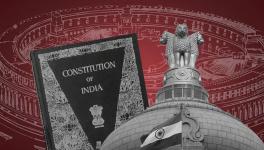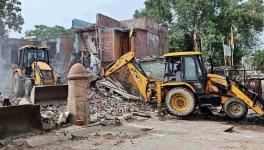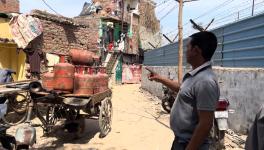Forced Evictions in Delhi: Slum Residents Face ‘Triple Whammy’
File Photo.
Slum dwellers in the national capital find their woes compounded by the looming threat of forced evictions by the government authorities – that continued apace last year and has not spared families despite the resurgence in COVID-19 cases now.
About 200 families residing in the informal housing settlements in Delhi were directly or indirectly affected by the demolition drive carried out by the authorities in the month of April. The eviction drives coincided with the surge in infection cases, putting under extreme stress the sub-optimal healthcare infrastructure in the city.
More worryingly, the evictions were carried out without any rehabilitation or alternative arrangements for the slum residents, activists have alleged.
“There had been three major evictions of bastis in Delhi in the month of April,” Shakeel Ahmed of Delhi Housing Rights Task Force (DHRTF) told NewsClick on Tuesday, May 11. Houses were demolished at Kalka Stone Basti, Lal Kuan in South Delhi; at Tughlaqabad Railway Basti in South Delhi; and, at Chilla Khadar in East Delhi, he added.
DHRTF is a coming together of residents, housing rights activists, lawyers and researchers in the wake of growing incidents of forced evictions in the national capital.
All these eviction drives were carried out before the shutdown measures were imposed in the city in April, according to Ahmed, who is also the convenor of Basti Suraksha Manch. “Actually, the eviction drives never really stopped in the city. There were 20 evictions carried out by different agencies despite a pandemic since last year. ,” he rued.
Lockdown was announced in Delhi from April 19 by Chief Minister Arvind Kejriwal in the face of a high positivity rate, an index of the pandemic’s current severity and its potential spread.
“There are no incidents of forced evictions reported in May as yet. As far as the affected families are concerned, some of them are now shifted to some makeshift arrangements. Many among them are also left in the open – without any roof now,” Ahmed said.
Also read: Loss of Housing Played Key Role Behind Delhi’s Migrant Exodus: Report
He further claimed that the areas where eviction drives were carried out fall under the O-zone, which is the Yamuna floodplain area, as per the Master Plan of Delhi-2021. The zone must be kept free from any permanent construction, according to an earlier direction by the National Green Tribunal (NGT).
However, there are more grave issues. “What we find in all the incidents of evictions is that no rehabilitation or alternative arrangement is being made by the authorities. This has unfortunately not changed even during the pandemic,” said Ankit Jha, another member of DHRTF.
NewsClick reached out to Delhi government’s Delhi Urban Shelter Improvement Board (DUSIB), the nodal agency for slum redevelopment over the rehabilitation measures for those evicted. “Whether these slums fulfil the requirement for rehabilitation or not is yet to be decided. The matter is pending in the court,” said Abdul Dayyan, Director, Rehabilitation at DUSIB.
On being asked about the reason for carrying out evictions amid a pandemic, Dayyan said that, “If there is an encroachment then it is the responsibility of the concerned authority to get the land cleared.”
Jha of DHRTF, however, pointed out that the provisions of the Delhi Slum and JJ Rehabilitation and Relocation Policy, 2015, prohibits eviction without orderly arrangement for relocation and rehabilitation of slum dwellers.
Moreover, the policy insists on ‘in situ’ rehabilitation of slum dwellers in which the DUSIB has to either provide alternative housing on the same land or within a 5 km radius of the original habitation.
“In the case pertaining to the demolition at Kalka Stone Basti, the matter was last heard in Delhi High Court on April 19; next date is in on May 19 now. We have also approached the High Court against the eviction in Tughlaqabad Railway Basti in which the first hearing is still pending right now,” Jha told NewsClick.
He added that the task force is aiming to get a court order that legally stays the eviction drives during the pandemic.
Last year in August, the Delhi-based Housing and Land Rights Network (HLRN) had said that at least 20,000 people were evicted during the COVID-19 pandemic till then across the country.
Marginalised Among Worst Affected
At the receiving end of these eviction drives are usually the informal workers – from rag pickers to domestic workers among others – whose lives are already marked with precarious existence.
“Any eviction during a pandemic is a triple whammy on these urban residents,” Jha claimed. “First, there’s the fear of contracting virus, then one struggles with the reality of having no work, no income due to the lockdown measures. Above all these, the homes of these people are razed.”
It is this last worry that has gripped 55-year old Srikant Singh. Having resided in Delhi’s Wazirpur area since past “30-32 years”, Singh felt the threat of homelessness more than ever last year when the Supreme Court had directed the removal of slums along railway tracks in the national capital, in an order on August 31, 2020.
Also read: Batla House Demolition: After Razing their Homes, Delhi Police Returns to Finish off Makeshift Tents
His home would have been among those razed, but Singh, led by the Communist Party of India (Marxist-Leninist) Liberation, sat on a hunger strike against the ruling. “Nothing has happened even after the Supreme Court ruling. But we don’t feel safe here,” lamented Singh, adding, “any day the authorities will knock our doors with a bulldozer.”
Following backlash, the Centre, in September, had told the apex court that immediate evictions of residents is ruled out for now. The court was to hear the matter after four weeks. However, no date is fixed yet, NewsClick has learnt.
The wait is adding tension to the concerned residents who demand that they must be provided with an alternative housing nearby. “There have been many surveys till now but there’s no sight of any rehabilitation plan. It’s tough to live like this,” Singh said.
Get the latest reports & analysis with people's perspective on Protests, movements & deep analytical videos, discussions of the current affairs in your Telegram app. Subscribe to NewsClick's Telegram channel & get Real-Time updates on stories, as they get published on our website.
























